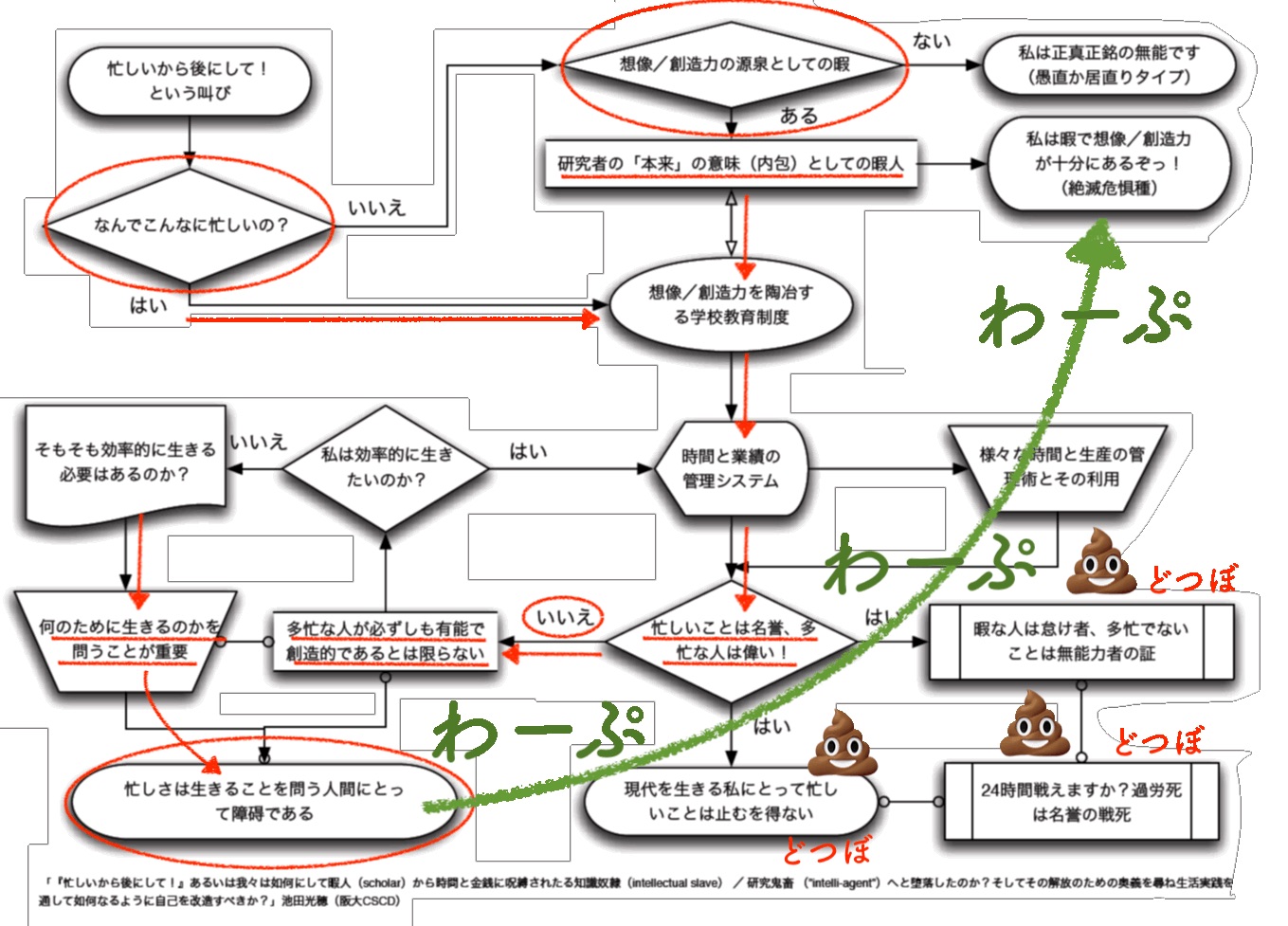「忙しいから後にして!」 あるいは我々は如何にして……
あるいは我々は如何にして……
Me
dejas porfa, estoy ocupad@ q me entiendas?
「忙しいから後にして!」 あるいは我々は如何にして……
あるいは我々は如何にして……
Me
dejas porfa, estoy ocupad@ q me entiendas?



正式のこの論文のタイトル:「『忙しいから後にして!』あるいは我々は如何にして暇人(scholar)から時間と金銭に呪縛されたる知識奴隷 (intellectual slave) / 研究鬼畜 (”intelli-agent”)へと堕落したのか?そしてその解放のための奥義を尋ね生活実践を通して如何なるように自己を改造すべきか?」 pantagruel roy des dipsodes, pagina original
みなさんは、このページをみて「センセイ、ネットならなんでも自由につぶやけていいですね」と揶揄されるかもしれない。しかし、このページの原 案は実際に、副学長=理事陪席のもとで、文科省の助成のものとで、研究されたものである。文科省にも私の職場にも、まともなものを許容する余地もあったの だ。
市智河團十郎の大学改革シリーズ:︎大学教育5つの常識▶︎大学の授業は「役にたつ」のか?▶︎︎条件なき「大学」とは?▶大学が真にオープンになるためには、大学そのものが内破しなければならない
▶︎︎大学そのものの社会化▶︎美しい大学解体論▶︎︎私語プロファイリング▶︎大学教授になるとはどういうことなのか▶︎︎▶︎▶︎
※以下は補注です。
・技 法に習熟しながらも言語化できない準理論的思考が、docta ignorantia である。知恵ある無知は、実践の習熟の全体像を彼ら自身の目から覆い隠す。習熟者が自分の実践を語りきれないという事実は、〈実践知〉の特徴(→兵法の極 意というイデオロギーの特徴?)。
・ただし、もともとのDocta ignorantia の意味は次のとおり。ニコラウス・クザーヌス(Nicolaus Cusanus, 1401-1464):神は「能産的自然(natura naturans)」、現象世界は「所産的自然(natura naturata)」と捉えて、この矛盾の一致を、神において認識することが「無知の知(docta ignorantia)」に他ならないと説く。(ニコラウス・クザーヌス『学識ある無知について』山田桂三訳、平凡社、1994年_第1部23章、ただし ニコライ・デ・クーサ[クザーヌスのラテン語名称]は、この用語では記述していない。英訳には、nature be prior to eternity(あるいは nature prior to [the effect] of the subsequent)などの特権的なものと nature concomitant などの峻別がある。)
英訳:Chapter Twenty-two: How God's foresight unites contradictories.
But so that we may also come to see how through the previous points we are led to a deep understanding, let us direct our inquiry to [the topic of] God's foresight. Since it is evident from the foregoing thatGod is the enfolding of all things, even of contradictories, [it is also evident that] nothing can escape His foresight. For whether we do some thing or its opposite or nothing, the whole of it was enfolded in God's foresight. Therefore, nothing will occur except in accordance with God's foreseeing. Hence, although God could have foreseen many things which He did not foresee and will not foresee and although He foresaw many things which He was able not to foresee, nevertheless nothing can be added to or subtracted from divine foresight. By way of comparison: Human nature is simple and one; if a human being were born who was never even expected to be born, nothing would be added to human nature. Similarly, nothing would be subtracted from human nature if [the human being] were not born—just as nothing [is subtracted] when those who have been born die. This [holds true] because human nature enfolds not only those who exist but also those who do not exist and will not exist, although they could have existed. In like manner, even if what will never occur were to occur, nothing would be added to divine foresight, since it enfolds not only what does occur but also what does not occur but can occur. Therefore,.just as in matter many things which will never occur are present as possibilities so, by contrast, whatever things will not occur but can occur: although they are present in God's foresight, they are present not possibly but actually. Nor does it follow herefrom that these things exist actually. Accordingly, we say that “human nature enfolds and embraces an infinite number of things” because it [enfolds] not only the human beings who did exist, do exist, and will exist but also those who can exist, though they never will (and so, human nature embraces mutable things immutably, just as infinite oneness [embraces] every number). In a similar way, God's infinite foresight enfolds not only the things which will occur but also the things which will not occur but can occur (and it enfolds contraries, even as a genus enfolds contrary differentiae). Those things which [infinite foresight] knows, it knows without a difference of times; for it is not the case that it knows future things as future, and past things as past; rather, it [knows] mutable things eternally and immutably. Hence, divine foresight is inescapable and immutable. Nothing can transcend it. Hence, all things related to it are said to have necessity- and rightly so, since in God all things are God,114 who is Absolute Necessity. And so, it is evident that the things which will never occur are present in God's foresight in the aforesaid manner, even if they are not foreseen to occur. It is necessary that God foresaw what He foresaw, because His foresight is necessary and immutable, even though He was able to foresee even the opposite of that which He did foresee. For if enfolding is posited, it is not the case that the thing which was enfolded is posited; but if unfolding is posited, enfolding is [also] posited. For example, although I am able to read or not to read tomorrow: no matter which of these I shall do, I will not escape [God's] foresight, which embraces [i.e., enfolds] contraries. Hence, whatever I shall do will occur in accordance with God's foresight. And so, the following is evident: how it is that through the foregoing points (which teach us that the Maximum precedes all opposition since it somehow embraces and enfolds all things), we apprehend what is true about God's foresight and other such matters.
・つまり先のものを解釈すると「技法に習熟しながら(as second nature)も言語化できない準理論的思考(natura naturata)が、docta ignorantia である。知恵ある無知は、実践の習熟の全体像(natura naturans)を彼ら自身の目から覆い隠す」ということになろうか?
オリジナル作図は画面をクリックしてください
生き方を変えて創造的に自己を再生する法
【心得】 万人に通ずるマニュアルはない(かも)。
【治病1】 身体実践を通して〈病んだ精神〉を改造。
【治病2】 仮病〈忙しいふり〉を粧い、忙しさをエスカレートさせる感染源に触れないこと。
【社会的予防】 〈忙しさ〉から逃れようとする自己への配慮と共に、呪縛されている病人の救済を乞い願うこと。
ご専門は?
「無知」あるいは「無知学」です。
無知への自覚こそ、学問探究の駆動力(エンジン)である。
現代社会において「知る歓び」が安売りされた結果、「無知を表明する」ということが勇気のいる発話になりつつあるのでは?
また無知状態と情報不足との混同がしばしば見られる。
もちろん無知にも良いものと悪いものがある。
悪い無知(R.S. Wurman 1989による)
知りすぎ病 見かけ惚れ込み病 相槌症候群 ピントはずれ比較病 過剰〈正確〉信奉病 過剰〈正確〉追求症 過剰形容病 早期記銘障害 詰め込み健忘症 ユーザーフレンドリー盲信症 誰にでもできる喧伝症 専門家の意見症候群 結末を教えない病 見せかけ情報病 管理病 豪華絢爛病
よい無知に自己を改造するための模索
ネオテニー(成長過程を逆にする)的方法
心理学者ジェローム・ブルーナーによると、(a)4,5歳の子供は積極的に身体を動かし、運動感覚でものを考える。(b)6〜8歳児は、それが 視覚優位に置き換わる。(c)さらに成長すると大人と同様、思考を記号操作するように翻訳することができる。
つまりネオテニー的方法は、上述の発達の系譜を逆向き(c)→(b)→(a)に遡行させる。
いわゆる理系の人たちがグラフや作図が好きなのは、単に学問的流儀だけではなく、このネオテニー的思考を実際におこなっている?
よい無知に自己を改造するための模索
若手(実年齢ではなくその分野への参入および熟達度および経験時間で判断された者)には暇の確保による修道院お籠もり法による学問の修練の継続 を!
中堅には〈想起的回顧〉による自己の研究の反省的と、それにもとづく新規研究事業の開発を!
熟達者には、若手と中堅の研究環境の育成を見守り保護措置をとるだけでなく、ネオテニー的方法により若手として生まれ変わり新しい研究に着手 を!
【拙僧の結論です!】大学人にとって〈暇〉と〈知的情熱〉が究極の知的回春剤となる!
